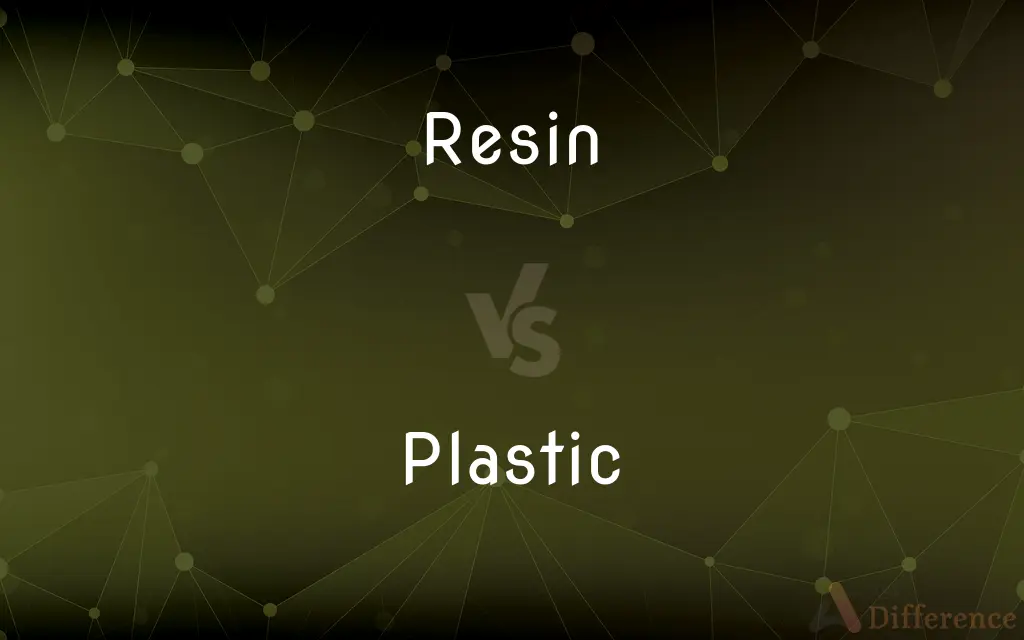Resin vs. Plastic — What's the Difference?
By Tayyaba Rehman — Updated on September 20, 2023
Resin is a natural or synthetic compound that becomes pliable when heated, while plastic is a synthetic material made from polymers and can be molded into various forms.

Difference Between Resin and Plastic
Table of Contents
ADVERTISEMENT
Key Differences
Resin is a substance, often sticky, that can be derived from plant or synthetic sources. Its natural form is primarily secreted by plants, particularly conifers. Plastic, on the other hand, is a broad term encompassing various synthetic or semi-synthetic materials that can be molded or shaped, typically made from petrochemicals.
While resin in its natural form has been around for millennia, being used in art, medicine, and various other applications, plastic is a relatively modern invention. The ability to mold plastic into a vast array of products has had a significant impact on modern life, offering convenience and versatility.
Resins can be converted into plastics through polymerization. The transformation involves a chemical process where monomers are bonded together to create polymers. Once polymerized, resins essentially become a type of plastic, showcasing how deeply interrelated these materials are.
In terms of environmental impact, many plastics are non-biodegradable and can persist in the environment for a very long time, leading to concerns about pollution and waste. Conversely, natural resins are typically more biodegradable, although synthetic resins may share similar environmental concerns as plastics.
From a user's perspective, both resins and plastics have found their way into everyday products. Resin, for instance, is found in varnishes and adhesives. Plastic, with its myriad of types, appears in everything from packaging to electronics, highlighting its ubiquitous nature.
ADVERTISEMENT
Comparison Chart
Origin
Can be natural (from plants) or synthetic.
Typically synthetic, made from petrochemicals.
Use
Found in varnishes, adhesives, and certain art materials.
Used in a vast array of products from toys to packaging.
Composition
Sticky substance, can be polymerized.
Made from polymers.
Environmental Impact
Natural resins are biodegradable; synthetic ones may not be.
Many types are non-biodegradable, leading to pollution.
Historical Context
Has been used for millennia in various applications.
A relatively modern material with diverse applications.
Compare with Definitions
Resin
Sticky Substance: Often tacky material that can harden over time.
Pine trees exude resin when damaged.
Plastic
Synthetic Material: Made from polymer compounds.
Plastic bottles are ubiquitous in grocery stores.
Resin
Base Material: Acts as a precursor to certain plastics.
Polyester resin is used in the manufacture of many plastic products.
Plastic
Diverse Varieties: Comes in multiple types and densities.
Polyethylene is a type of plastic used in shopping bags.
Resin
Natural Compound: A viscous substance derived from plants.
Amber is a type of fossilized resin.
Plastic
Plastics are a wide range of synthetic or semi-synthetic materials that use polymers as a main ingredient. Their plasticity makes it possible for plastics to be moulded, extruded or pressed into solid objects of various shapes.
Resin
Synthetic Variant: Can be man-made for industrial purposes.
Epoxy resin is popular in DIY crafts.
Plastic
A synthetic material made from a wide range of organic polymers such as polyethylene, PVC, nylon, etc., that can be moulded into shape while soft, and then set into a rigid or slightly elastic form
Mains pipes should be made of plastic or copper
Bottles can be made from a variety of plastics
Resin
In polymer chemistry and materials science, resin is a solid or highly viscous substance of plant or synthetic origin that is typically convertible into polymers. Resins are usually mixtures of organic compounds.
Plastic
Made of plastic
Plastic bottles
Resin
A sticky flammable organic substance, insoluble in water, exuded by some trees and other plants (notably fir and pine)
Clear resin had oozed to the surface, trickled down, and set
Plastic
(of a substance or material) easily shaped or moulded
Rendering the material more plastic
Resin
A solid or liquid synthetic organic polymer used as the basis of plastics, adhesives, varnishes, or other products
Epoxy resins frequently cause dermatitis
The chassis is constructed of synthetic resin
Plastic
Capable of being shaped or formed
Plastic material such as clay.
Resin
Rub or treat with resin
Resined canvas
Plastic
Relating to or dealing with shaping or modeling
The plastic art of sculpture.
Resin
Any of numerous clear to translucent yellow or brown, solid or semisolid, viscous substances of plant origin, such as copal, rosin, and amber, used principally in lacquers, varnishes, inks, adhesives, plastics, and pharmaceuticals. Resins are usually insoluble in water.
Plastic
Having the qualities of sculpture; well-formed
"the astonishing plastic beauty of the chorus girls" (Frank Harris).
Resin
Any of numerous physically similar polymerized synthetics or chemically modified natural resins including thermoplastic materials such as polyvinyl, polystyrene, and polyethylene and thermosetting materials such as polyesters, epoxies, and silicones that are used with fillers, stabilizers, pigments, and other components to form plastics.
Plastic
Giving form or shape to a substance
The plastic forces that create and wear down a mountain range.
Resin
To treat or rub with resin.
Plastic
Easily influenced; impressionable
"The plastic mind of the bank clerk had been ... distorted by what he had read" (Rudyard Kipling).
Resin
A viscous hydrocarbon secretion of many plants, particularly coniferous trees.
Plastic
Made of a plastic or plastics
A plastic garden hose.
Resin
Any of various yellowish viscous liquids or soft solids of plant origin; used in lacquers, varnishes and many other applications; chemically they are mostly hydrocarbons, often polycyclic.
Plastic
(Physics) Capable of undergoing continuous deformation without rupture or relaxation.
Resin
Any synthetic compound of similar properties.
Plastic
Capable of building tissue; formative.
Resin
(transitive) To apply resin to.
Plastic
Able to change and adapt, especially by acquiring alternative pathways for sensory perception or motor skills. Used of the central nervous system.
Resin
Any one of a class of yellowish brown solid inflammable substances, of vegetable origin, which are nonconductors of electricity, have a vitreous fracture, and are soluble in ether, alcohol, and essential oils, but not in water; specif., pine resin (see Rosin).
Plastic
Marked by artificiality or superficiality
A plastic world of fad, hype, and sensation.
Resin
Any of various polymeric substance resembling the natural resins[1], prepared synthetically; - they are used, especially in particulate form, in research and industry for their property of specifically absorbing or adsorbing substances of particular types; they are especially useful in separation processes such as chromatography; as, an ion-exchange resin.
Plastic
(Informal) Of or obtained by means of credit cards
Plastic money.
Resin
Any of a class of solid or semisolid viscous substances obtained either as exudations from certain plants or prepared by polymerization of simple molecules
Plastic
Any of various organic compounds produced by polymerization, capable of being molded, extruded, cast into various shapes and films, or drawn into filaments used as textile fibers.
Resin
Art Material: Used in art for casting and coating.
The artist used resin to give the artwork a glossy finish.
Plastic
(Informal) A credit card or credit cards
Would accept cash or plastic in payment.
Plastic
A synthetic, solid, hydrocarbon-based polymer, whether thermoplastic or thermosetting.
Plastic
Credit or debit cards used in place of cash to buy goods and services.
Plastic
Insincerity; fakeness, or a person who is fake or arrogant, or believes that they are better than the rest of the population.
Plastic
An instance of plastic surgery.
Plastic
(obsolete) A sculptor, moulder.
Plastic
(archaic) Any solid but malleable substance.
Plastic
Capable of being moulded; malleable, flexible, pliant.
Plastic
Producing tissue.
Plastic
(dated) Creative, formative.
Plastic
(biology) Capable of adapting to varying conditions; characterized by environmental adaptability.
Plastic
Of or pertaining to the inelastic, non-brittle, deformation of a material.
Plastic
Made of plastic.
Plastic
Inferior or not the real thing.
Plastic
Fake; insincere.
Plastic
Having the power to give form or fashion to a mass of matter; as, the plastic hand of the Creator.
See plastic Nature working to his end.
Plastic
Capable of being molded, formed, or modeled, as clay or plaster; - used also figuratively; as, the plastic mind of a child.
Plastic
Pertaining or appropriate to, or characteristic of, molding or modeling; produced by, or appearing as if produced by, molding or modeling; - said of sculpture and the kindred arts, in distinction from painting and the graphic arts.
Medallions . . . fraught with the plastic beauty and grace of the palmy days of Italian art.
Plastic
A substance composed predominantly of a synthetic organic high polymer capable of being cast or molded; many varieties of plastic are used to produce articles of commerce (after 1900). [MW10 gives origin of word as 1905]
Plastic
Generic name for certain synthetic or semisynthetic materials that can be molded or extruded into objects or films or filaments or used for making e.g. coatings and adhesives
Plastic
Used of the imagination;
Material...transformed by the plastic power of the imagination
Plastic
Capable of being molded or modeled (especially of earth or clay or other soft material);
Plastic substances such as wax or clay
Plastic
Capable of being influenced or formed;
The plastic minds of children
A pliant nature
Plastic
Moldable Substance: Can be shaped into various forms.
The plastic was molded into the shape of a toy soldier.
Plastic
Ubiquitous Use: Found in numerous everyday products.
The keyboard I'm using is primarily made of plastic.
Plastic
Environmental Concern: Many variants do not degrade easily.
Discarded plastic bottles contribute to environmental pollution.
Common Curiosities
Can resin be considered a type of plastic?
Once polymerized, resins can essentially become a type of plastic.
Why is resin used in art?
Resin can provide a glossy finish and is used in casting, coating, and other art applications.
What is the primary source of natural resin?
Natural resin is primarily derived from plants, especially conifers.
Are all plastics harmful to the environment?
Many plastics are non-biodegradable and pose environmental concerns, but there are also biodegradable and eco-friendly plastic variants.
Is plastic a modern invention?
Yes, plastic, as we know it, is a relatively modern invention, gaining popularity in the 20th century.
How is plastic typically made?
Plastic is typically made from petrochemicals through a polymerization process.
How are resins transformed into plastics?
Resins can be converted into plastics through a chemical process of polymerization.
Can both resin and plastic be synthetic?
Yes, there are both natural and synthetic resins, while plastics are typically synthetic.
Share Your Discovery

Previous Comparison
Only vs. Just
Next Comparison
Milligram vs. GramAuthor Spotlight
Written by
Tayyaba RehmanTayyaba Rehman is a distinguished writer, currently serving as a primary contributor to askdifference.com. As a researcher in semantics and etymology, Tayyaba's passion for the complexity of languages and their distinctions has found a perfect home on the platform. Tayyaba delves into the intricacies of language, distinguishing between commonly confused words and phrases, thereby providing clarity for readers worldwide.















































